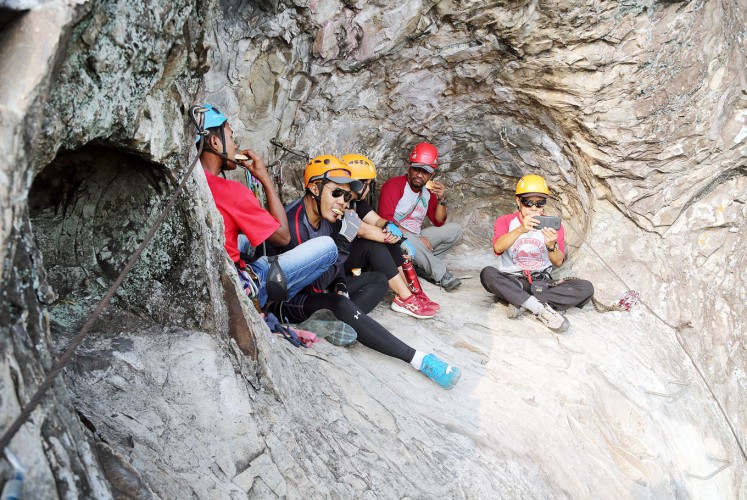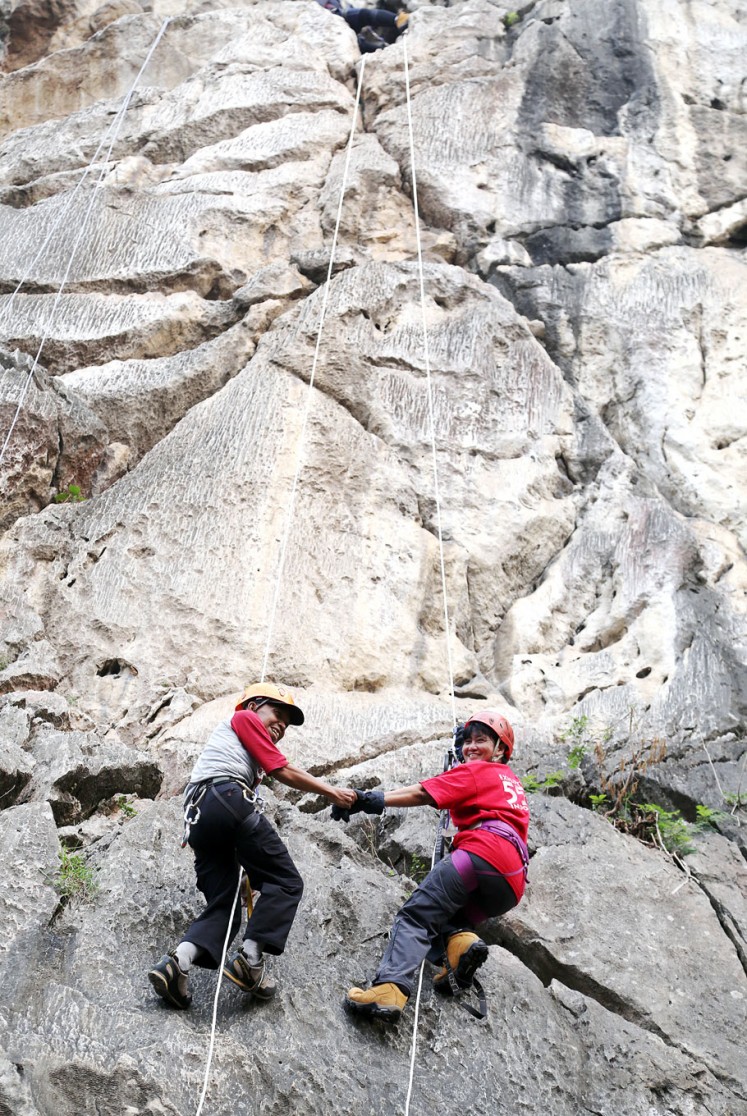Popular Reads
Top Results
Can't find what you're looking for?
View all search resultsPopular Reads
Top Results
Can't find what you're looking for?
View all search resultsMuhamad Gunawan: The mountain climbing cancer survivor
Change text size
Gift Premium Articles
to Anyone
M
ountain climber Muhammad “Ogun” Gunawan wants to make sure that before he passes away, his dream of conquering Mount Everest comes true.
As a member of Wanadri (Association of Mountain and Jungle Explorers), Ogun has always adhered to the community’s motto: “There are no high mountains, dense jungles, steep valleys, deep seas and skies that Wanadri cannot explore.”
Even after being diagnosed with nasopharyngeal cancer, Ogun has remained enthusiastic and kept on fighting the disease that has entered its fourth stage by continuing his mountaineering activities and pursuing his dream to scale the peak of Mount Everest.
“The cancer plaguing my body will be cured by maintaining a strong determination and high spirits instead of lamenting in sorrow,” Ogun said.
Ogun, who was born in Jakarta in 1958, had his first taste of mountain climbing back in 1973 as a junior high school student.
His love of mountains and the environment grew even more after he joined Wanadri in 1981.
As a climber, his dream has always been to conquer Mount Everest, which he has climbed twice but not yet succeeded in reaching the summit.
Ogun was a member of the 1997 Indonesian Mount Everest Expedition along with the Special Force Command (Kopassus). Earlier in 1994, Ogun had also climbed the world’s highest mountain with the International Mountaineering Corporate Team.
“In the 1994 Everest ascent, I only reached a height of 7,900 meters due to storms. None of us made it,” Ogun said.
“With Kopassus, I managed to reach 8,600 m, with only 200 m to go, but the dream failed again,” he added with disappointment.
The idea of finally realizing the Everest dream came back to Ogun in January 2017, when he felt he could survive his nasopharyngeal cancer. For Ogun, reaching the peak of Everest would give his life meaning.
Rest and relax: Ogun and his fellow climbers take a break during a climb. (JP/P.J. Leo)As a senior mountaineer already popular among nature lovers, Ogun has conducted expeditions in various parts of the world such as Mount Reinier in the United States, India’s Vasuki Parbat, Kilimanjaro in Africa and four mountains in Nepal: Kangchenjunga, Paldor, Pumori and Island Peak.
Ogun has also climbed Indonesian mountains including Papua’s Puncak Jaya of Mount Jayawijaya, better known as Carstenz Pyramid, the highest summit in Indonesia. Carstenz Pyramid is also one of the seven highest peaks on the continental plates along with Mount Everest (Asia), Kilimanjaro (Africa), Elbrus (Europe), Aconcagua (South America), McKinley (North America) and Vinson Massif (Antarctica).
However, in November 2015, Ogun had to temporarily halt his climbing when he began to suffer from double vision due to the trouble that occurred in his throat. Later on, his hearing began to deteriorate.
Iqbal, his close friend and a physician, suggested that Ogun consult a specialist for biopsy.
Alas, the diagnosis said that Ogun suffered from nasopharyngeal cancer.
The dangerous ailment affecting the nose and throat was already in its fourth and final stage as it began to spread to Ogun’s upper chest.
Cecilia Enny Yashita Aprijanti, or Vita, Ogun’s wife and also a mountaineer, tried to console her spouse and convince him to face the reality with optimism.
After 38 radiotherapy sessions and 11 chemotherapy sessions, his cancerous tissues were weakened although not yet totally destroyed, and his body weight had decreased by 20 kilograms.
“It was a very long treatment process with a very high cost. Fortunately I’ve got a healthcare and social security [BPJS] card, otherwise I don’t know how my fate would turn out,” Ogun said.
Always together: Ogun and his wife, Cecilia Yashita, hold hands during a climb. (JP/P.J. Leo)In July 2016, Ogun had his last round of radiotherapy, which dispelled any doubts he had about getting back to nature at the end of his medical care.
Thus, Ogun returned to climbing by taking on several mountains, from the Bukit Hitam Kepahiang in Bengkulu, Sumatera to the settlements of the Badui Dalam tribes located in the rough hilly terrains of Banten in West Java.
“My activity is for therapy and recovery, for my pursuit and religious devotion. I feel it is more of a spiritual journey,” Ogun said.
Ogun simply refuses to give up and strives to fight his cancer, as shown in a book called “Ogun, Cancer Survivor to Scale World’s Peak,” which is written by Zhibril, his junior in Wanadri.
Ogun has also drawn up his program to conquer Everest.
In 2017, Ogun began practicing for his big quest by conquering mountain peaks that are challenging but also lower than that of Everest, including Mounts Yala (5,520 m) and Nayakanga (5,844 m), both in Nepal, and Mount Elbrus (5,642 m) in Russia.
From Sept. 27 to Oct. 19, Ogun, his wife and climbing peers will again go to Nepal to climb Mera Peak (6,476 m).
“It is in kang (brother) Ogun’s agenda to scale the Everest summit in 2018, a year which will mark his 60th birthday. The Everest expedition is scheduled between April and May 2018,” Handoko Latuconsina, a Wanadri junior who accompanied Ogun during his recent climb of Tebing Citatah 125 in Pandeglang, said.
Climbing Everest is very risky for Ogun due to his condition. The nasopharyngeal cancer affects his respiration capacity while the air at Everest’s summit is thin and cold. The main challenge for Ogun, therefore, is protecting himself from hypothermia and frostbite.
Ogun said that he was well aware of the risks but he was also ready to face them.
“What we’ll conquer is ourselves, whether we’re afraid or not, whether we go on or not. That’s the challenge,” Ogun said.













